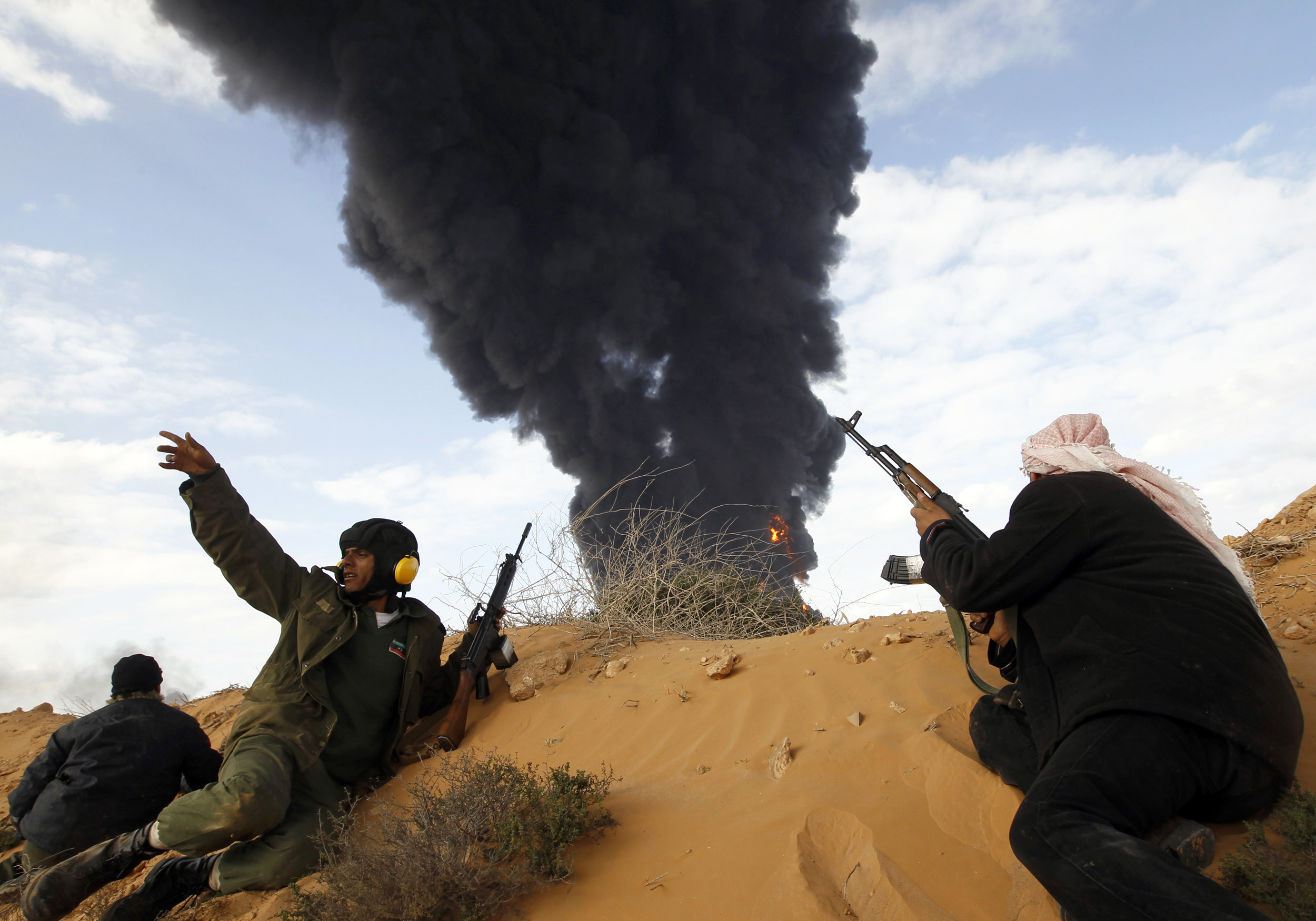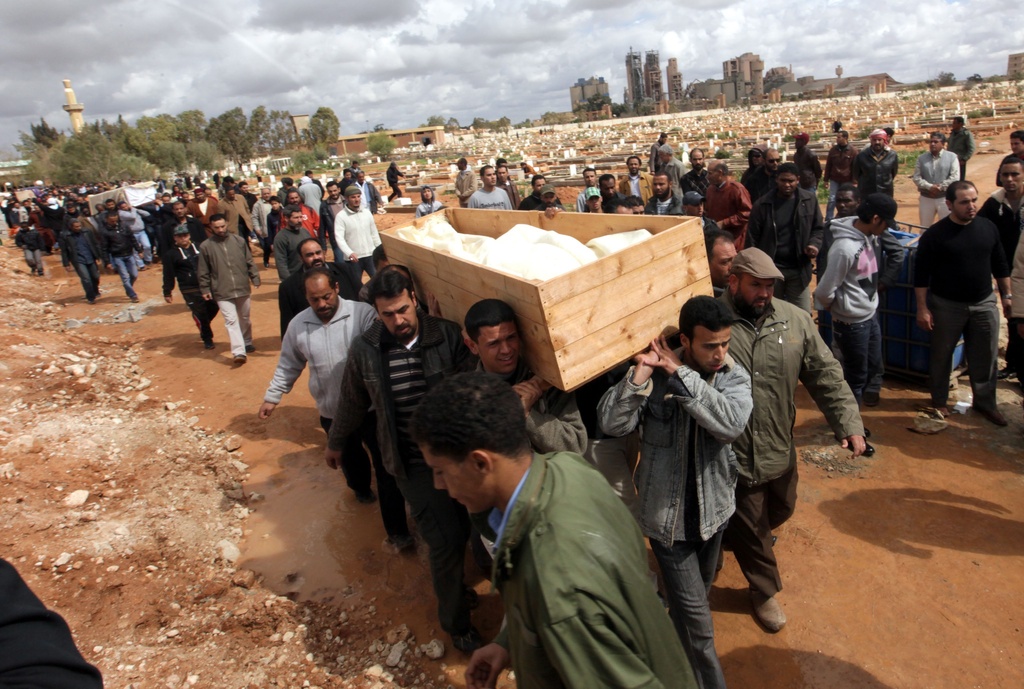Aid agencies brace for Libyan civil war

As Libya descends into civil war, the Swiss-based International Committee of the Red Cross (ICRC) says it is “preparing for the worst”.
The ICRC is one of the few international aid agencies in Libya, alongside Médecins sans Frontières (MSF), working in the rebel-held eastern region. However, both are still unable to gain access to areas controlled by Moammar Gaddafi’s regime.
“We always have to prepare for the worst. In this specific case, we have to prepare for a further intensification of the fighting,” ICRC President Jakob Kellenberger told reporters in Geneva on Thursday.
Kellenberger said he had no overall casualty figures for the country. But he said that fighting had intensified and local doctors had seen a sharp rise in casualties with reports of at least 22 bodies and 40 wounded in Misrata after recent air strikes. Some 55 wounded were treated in Ajdabiya hospital in the east this week.
ICRC delegate Hicham Hassan, who is part of the 20-strong team in Benghazi and Ajdabiya, confirmed the recent increase.
“Over the past four days the number has increased significantly with tens of injured persons in Ajdabiya, Brega and Misrata,” he told swissinfo.ch.
He said he regularly received telephone calls from other parts of the country describing the violence there.
“They call us as the Red Cross and ask us to help but we don’t have access to the west. I got a call from a doctor from Zawiya who reported tens of injured people and I got a report from a doctor from Ras Lanuf who said there were tens of injuries and talked about dozens of missing people.”
Duccio Staderini, a Geneva-based emergency coordinator for MSF, said he was hearing similar information.
“We have received accounts of massive influxes of wounded in Zawiya and Misrata but the information is not first-hand and cannot be confirmed or infirmed,” he said.
Access to west
Kellenberger, who described the situation in Libya as a civil war, urged Libyan authorities to grant the ICRC access to western areas, including the capital Tripoli, and reminded both sides that civilians and medical facilities must not be targeted.
ICRC and MSF medical teams are currently held up at the Tunisian border waiting for permission to enter Libya.
Despite repeated demands, the ICRC has been told that there is no need for outside help in the areas held by Libyan forces.
“I have been told that everything is under control, that all hospitals are working perfectly and there is no need for external international assistance. And we are worried, we would like to assess ourselves what is the situation,” Kellenberger explained.
Staderini echoed this: “Our visa applications have been denied, arguing that the situation is quiet and that nothing is happening.”
Over the past two weeks MSF and the ICRC have set up bases in rebel-held Benghazi in the east where they are providing medical assistance and supplies to hospitals, performing war surgery and helping stranded migrants. But both are hoping to scale up their operations.
“Most foreigners were evacuated [from Benghazi], which left the hospitals with big shortages. But even without large numbers of nurses and the traumatic situation, the Libyan doctors have managed to deal with the bulk of injuries in record time,” said Hassan.
Refugee crisis
As the unrest and fighting has intensified, almost 100,000 migrants have flocked from Libya through the overcrowded border crossing near the town of Sallum in Egypt. Two-thirds of them are Egyptians returning home but the remainder are mostly foreign labourers from neighbouring African countries.
A similar number have also fled into Tunisia. But international officials believe a sudden drop in the number trying to cross that border indicates that refugees trying to flee Libya in the west are being held back. The Tunisian state news agency TAP said 1,800 refugees entered the country from Libya on Monday, down from about 12,000 the day before.
“We are very worried by the fact that people are being prevented from leaving Libya,” UNHCR spokeswoman Melissa Fleming told swissinfo.ch. “We have heard about road blocks where people are stopped, intimidated or have their phones and cameras seized. Some roads in Tripoli are closed; we don’t know if this is a permanent measure but we received numerous accounts on Wednesday.”
Although the situation for Libyan citizens is serious, some foreign communities living in the north African state are particularly badly affected.
“We have some Libyan colleagues in Tripoli who are doing their best to help refugees, in particular from sub-Saharan Africa – Somalia and Eritrea – who fear for their lives. They are being hunted; armed Libyans go from house to house looking for them. They feel trapped. It’s a horrible situation,” said Fleming.
France recognised the Benghazi-based National Libyan Council as the legitimate representative of Libya’s people on March 10, the first country to make the move. Swiss President Micheline Calmy-Rey met a representative of the council in Bern the previous day.
The rebels, buoyed by French recognition, vowed to fight on against Gaddafi’s rule, even without a no-fly zone.
Nato and the European Union are looking into imposing a “no-fly” zone over Libya to stop Gaddafi using air power against the rebels, who seized a string of cities east and west of Tripoli early in the three-week-old war to end Gaddafi’s 41 years of rule.
On March 10 Gaddafi’s forces pushed rebel fighters from the strategic oil port of Ras Lanuf.
In the west, Gaddafi’s army laid siege to Zawiya, apparently trying to starve out insurgents still clinging to parts of the city.
The Swiss-run International Committee of the Red Cross (ICRC) has sent two medical teams to Benghazi in eastern Libya to support the Libyan Red Crescent. Another medical team is currently held up at the Tunisian border waiting for approval to enter western Libya.
The ICRC is preparing to scale up its operation and last week launched an appeal for funds to assist 210,000 people over the next two months.
The money will be used to provide basic supplies and services, including food, water, medical care, sanitation and hygiene items, for around 110,000 people inside Libya and for an additional 100,000 crossing over the border into Tunisia.
Since February 24 MSF has had a team of doctors and experts working in eastern Libya and another team deployed at the western border ready to enter when possible.
The UN has appealed for $160 million for one million people fleeing Libya and inside the country.

In compliance with the JTI standards
More: SWI swissinfo.ch certified by the Journalism Trust Initiative














You can find an overview of ongoing debates with our journalists here . Please join us!
If you want to start a conversation about a topic raised in this article or want to report factual errors, email us at english@swissinfo.ch.